Everyone has to scratch on the walls somewhere or they go crazy.
--Michael Ondaatje, In the Skin of a Lion
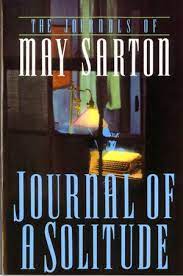 As a reader, I've long preferred journals and diaries to biographies. In an interview, May Sarton once said that "people don't read the journals to discover me; they read the journals to discover themselves." That sounds about right. Sarton's works--particularly Journal of a Solitude and The House by the Sea--have been part of my life for decades. Other longtime companions include the journals of Ralph Waldo Emerson and Thomas Merton, as well as the travel writings of Matsuo Bashō.
As a reader, I've long preferred journals and diaries to biographies. In an interview, May Sarton once said that "people don't read the journals to discover me; they read the journals to discover themselves." That sounds about right. Sarton's works--particularly Journal of a Solitude and The House by the Sea--have been part of my life for decades. Other longtime companions include the journals of Ralph Waldo Emerson and Thomas Merton, as well as the travel writings of Matsuo Bashō.
And I'm always up for something new, or even variations on a theme, like John McPhee's recent book Tabula Rasa, Part 1, in which he gathered up sketches, anecdotes and ideas for stories and books that never made it past the notion stage.
Some fortunate authors, like most of those mentioned above, kept journals to store project ideas and personal reflections, gossip and weather reports, but they also kind of knew that someday their "private" observations would be published. Most diarists, however, are filling pages with words that will inevitably be condemned to the hellfires of public landfills. Why do they do it? Well, why not?
Almost every bookstore now carries a selection of blank books, colorful notebooks and engagement calendars (potential diaries in disguise), ranging from pricey Moleskins and their upscale competitors to an endless variety of themed options.
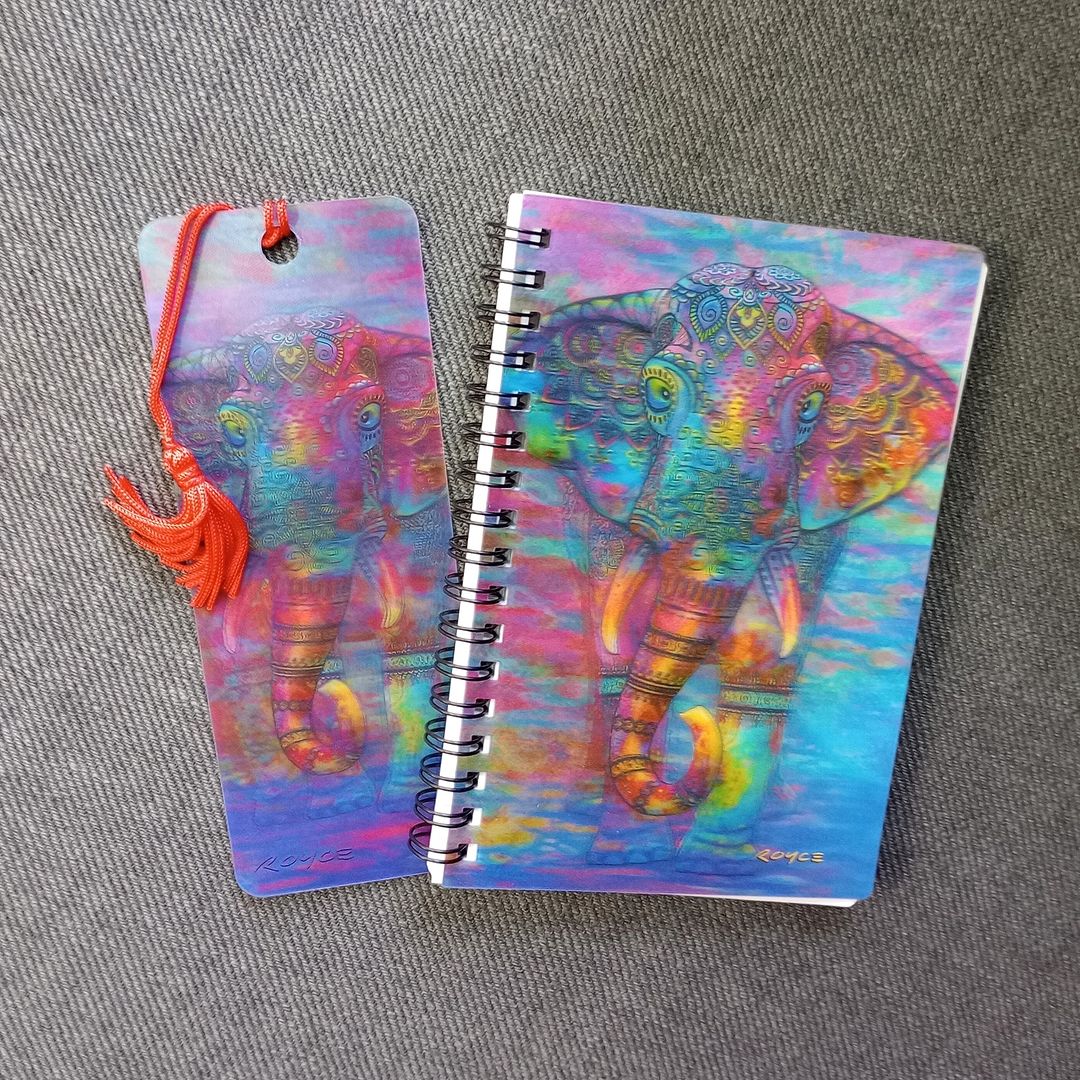 Just yesterday, I noticed that Plaid Elephant Books, Danville, Ken., had posted on Instagram: "We have several matching 'sets' of lenticular (i.e. 3D) bookmarks and notebooks, but this one is our favorite.... New shipment arriving next week, just in time for back-to-school!"
Just yesterday, I noticed that Plaid Elephant Books, Danville, Ken., had posted on Instagram: "We have several matching 'sets' of lenticular (i.e. 3D) bookmarks and notebooks, but this one is our favorite.... New shipment arriving next week, just in time for back-to-school!"
And U.K. bookseller White Rose Bookcafe, Thirsk, showcased "some lovely new 2024 Diaries in stock now, so you can look forward & plan even more good stuff that you & your family can enjoy! Sue says 'This is my all-time favourite journal and I've been using it for over 8 years. I love the weekly inspiring quotes from poets and famous people like Rumi and Maya Angelou. The monthly themes are helpful for reflection and personal development. I treasure my journal time with a morning coffee and birdsong!' Designed as a resource to enrich daily life, with new vibrant illustrations alongside one life-enhancing theme a month for you to focus on."
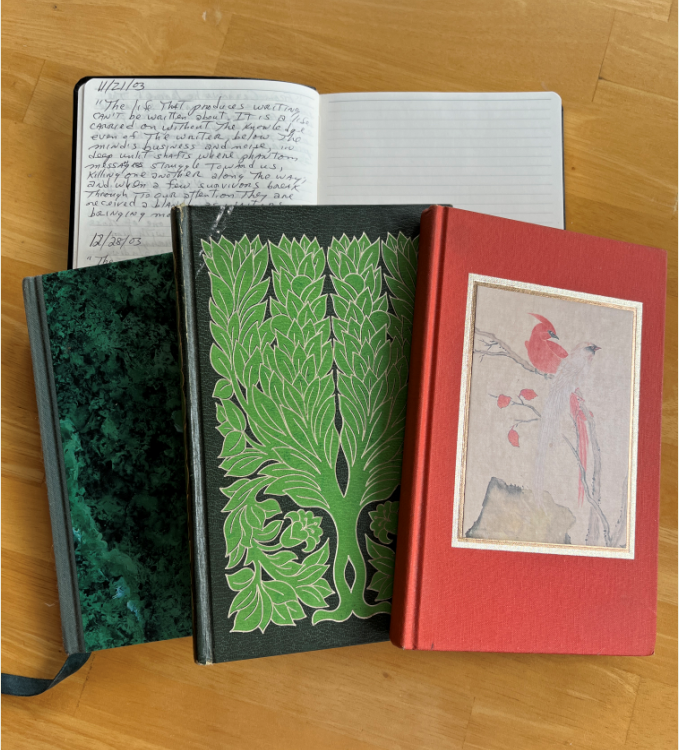 As a writer, I confess I've been pretty rubbish at keeping a journal or diary myself. Not that I haven't tried over the years. I still have some leftover blank books (or semi-blank, I suppose) lying about as evidence of my feeble attempts. Each was purchased with the best of intentions. Each, inevitably, briefly became a commonplace book--the pages filled quotations from books I was reading at the time--and then was abandoned.
As a writer, I confess I've been pretty rubbish at keeping a journal or diary myself. Not that I haven't tried over the years. I still have some leftover blank books (or semi-blank, I suppose) lying about as evidence of my feeble attempts. Each was purchased with the best of intentions. Each, inevitably, briefly became a commonplace book--the pages filled quotations from books I was reading at the time--and then was abandoned.
Where was I in these journals? Just a reader collecting other writers' words. Even then, my patience wore thin. The empty pages always begin no more than a quarter of the way into each volume.
I guess I'm not alone. The blog Diaries of Note recently wrote that although Thomas Edison "filled numerous notebooks with writings pertaining to his groundbreaking inventions, he kept a personal diary only once in his eighty-four years. Spanning a period of just nine days in July of 1885."
 On July 20, Edison wrote: "It's so hot--I put everything off--Hot weather is the mother of procrastination--my energy is at ebb tide--I'm getting Caloricly stupid--Tried to read some of the involved sentences in Miss Cleveland's book, mind stumbled on a ponderous perioration and fell in between two paragraphs and lay unconscious for ten minutes." A nine-day journal. The End. That I can identify with.
On July 20, Edison wrote: "It's so hot--I put everything off--Hot weather is the mother of procrastination--my energy is at ebb tide--I'm getting Caloricly stupid--Tried to read some of the involved sentences in Miss Cleveland's book, mind stumbled on a ponderous perioration and fell in between two paragraphs and lay unconscious for ten minutes." A nine-day journal. The End. That I can identify with.
While my sideline as a journal-keeper flailed repeatedly, I was a fan of bookstore sidelines from the moment I first heard the term in 1992, when I became a bookseller in a shop that even had a full-time Sidelines Buyer.
Back then there were still a lot of skeptical booksellers who were reluctant to carry non-book inventory, though I suspect the percentage of books-only purists has dwindled substantially over the past three decades, for high-margin retail survival tool reasons if nothing else.
Most indie booksellers love the handselling high that comes from a conversation resulting in a tidy stack of great books leaving the shop with an enthusiastic reader. On the other hand, those booksellers won't complain if the next customer they wait on buys no books at all, but loads up on greeting cards, toys, souvenir t-shirts, tote bags, scarves, candy, magnets and locally produced salsa. What does a great indie bookseller say to the bookless patrons? Thank you so much. Please come back soon.
As for blank books, they're also the perfect response to this particular sales floor customer service dilemma:
I need a book as a gift for my uncle.
What kinds of books does he like to read?
He doesn't read.
Well, how about a blank book then?
What does the future hold for blank books? Are we really on the cusp of seeing my April Fool's Day prediction from 2022 (Ted Cruz Slams Blank Book Sales for "Potentially Offensive Content") enter the unnerving realm of possibility? Don't stay on the sidelines, journal keepers and sellers. Write on.
 The union at Solid State Books, Washington, D.C., has unanimously ratified its first contract with the bookstore, after negotiations that took 17 days, a very short period for most contract negotiations. The contract makes Solid State Books the second bookstore in the capital with a collective bargaining agreement following the contract reached by Politics & Prose and its union. The Solid State Books contract was modeled on the Politics & Prose agreement. Both bookstores' unions are affiliated with the United Food & Commercial Workers (UFCW) Local 400 Union.
The union at Solid State Books, Washington, D.C., has unanimously ratified its first contract with the bookstore, after negotiations that took 17 days, a very short period for most contract negotiations. The contract makes Solid State Books the second bookstore in the capital with a collective bargaining agreement following the contract reached by Politics & Prose and its union. The Solid State Books contract was modeled on the Politics & Prose agreement. Both bookstores' unions are affiliated with the United Food & Commercial Workers (UFCW) Local 400 Union.




IPC.0204.S3.INDIEPRESSMONTHCONTEST.gif)




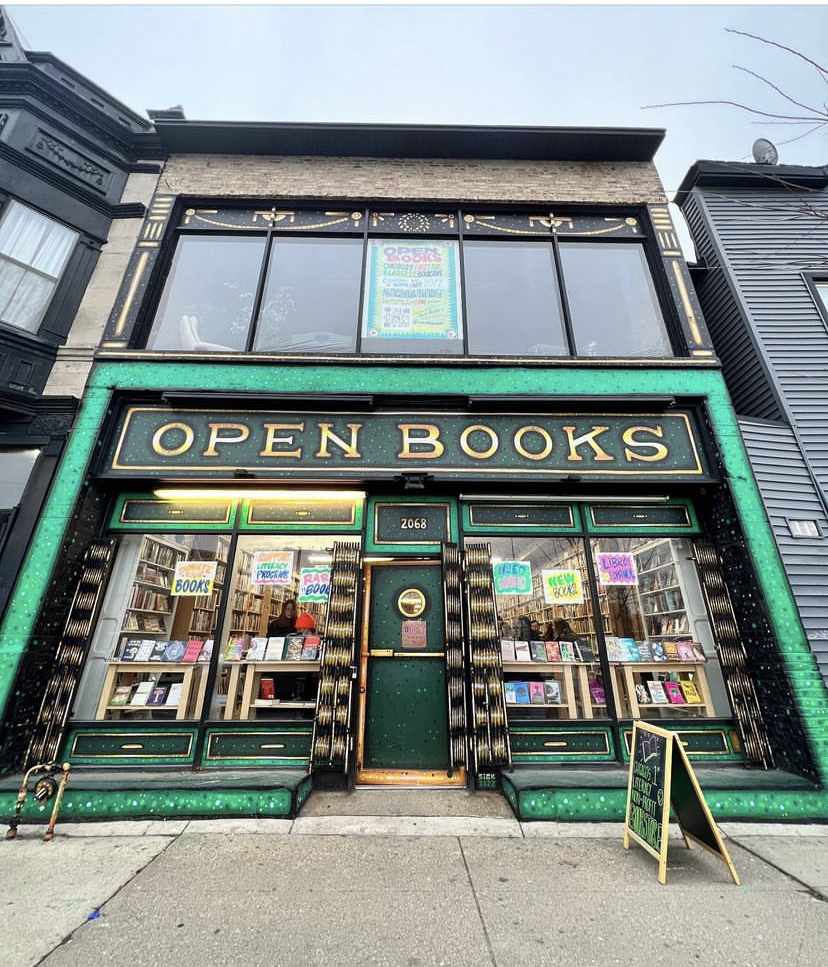



IPC.0211.T4.INDIEPRESSMONTH.gif)


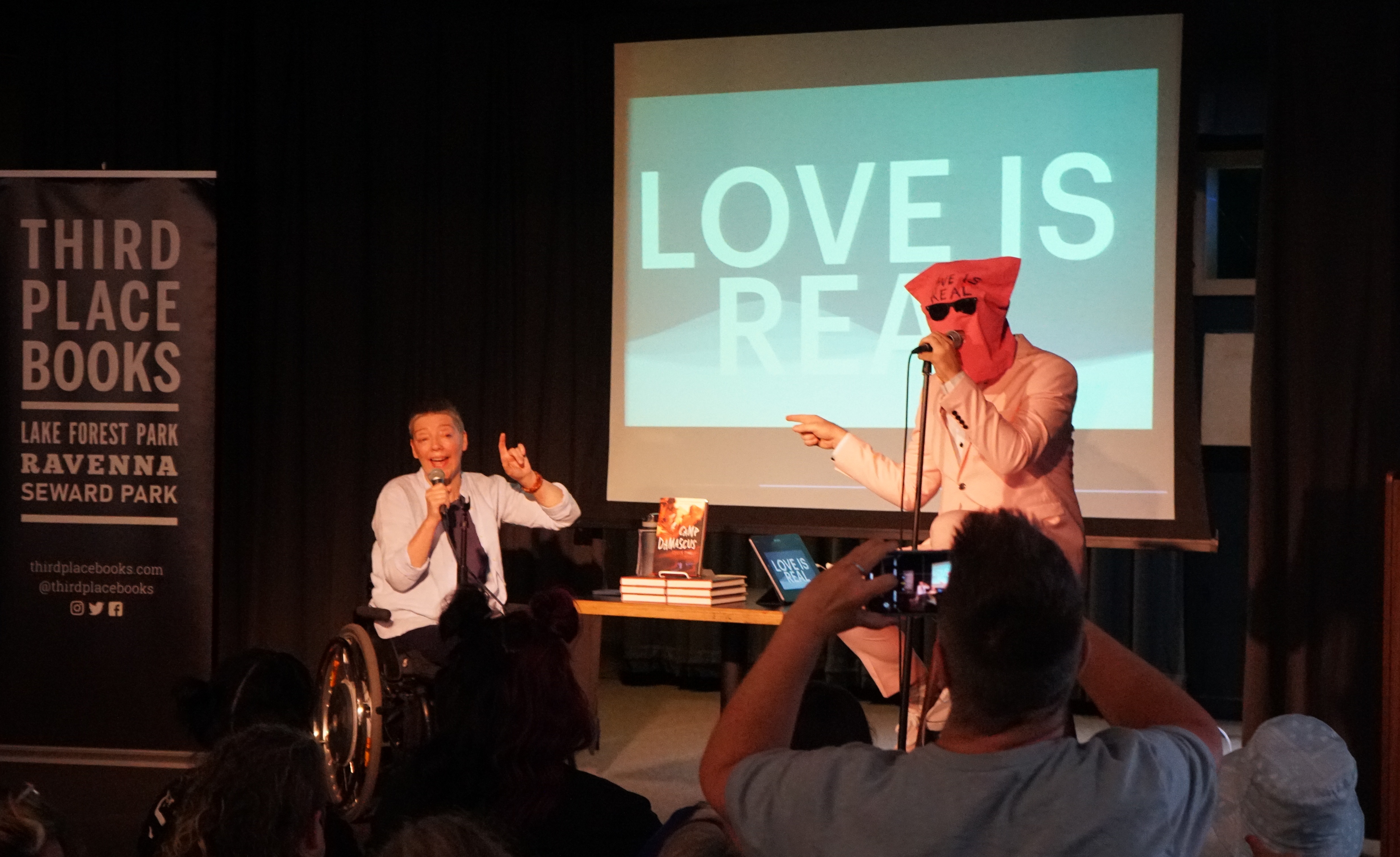 Chuck Tingle (r.), queer Internet icon and
Chuck Tingle (r.), queer Internet icon and 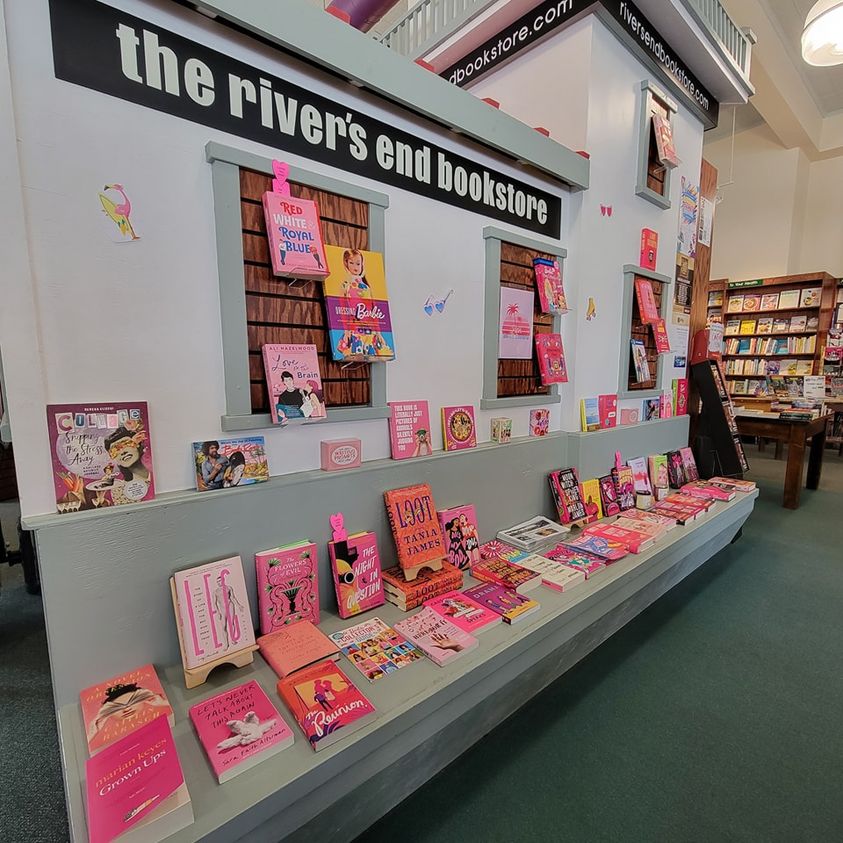 "While Oppenheimer's bio is on our bestseller list,
"While Oppenheimer's bio is on our bestseller list,  Giants Are Very Brave People
Giants Are Very Brave People
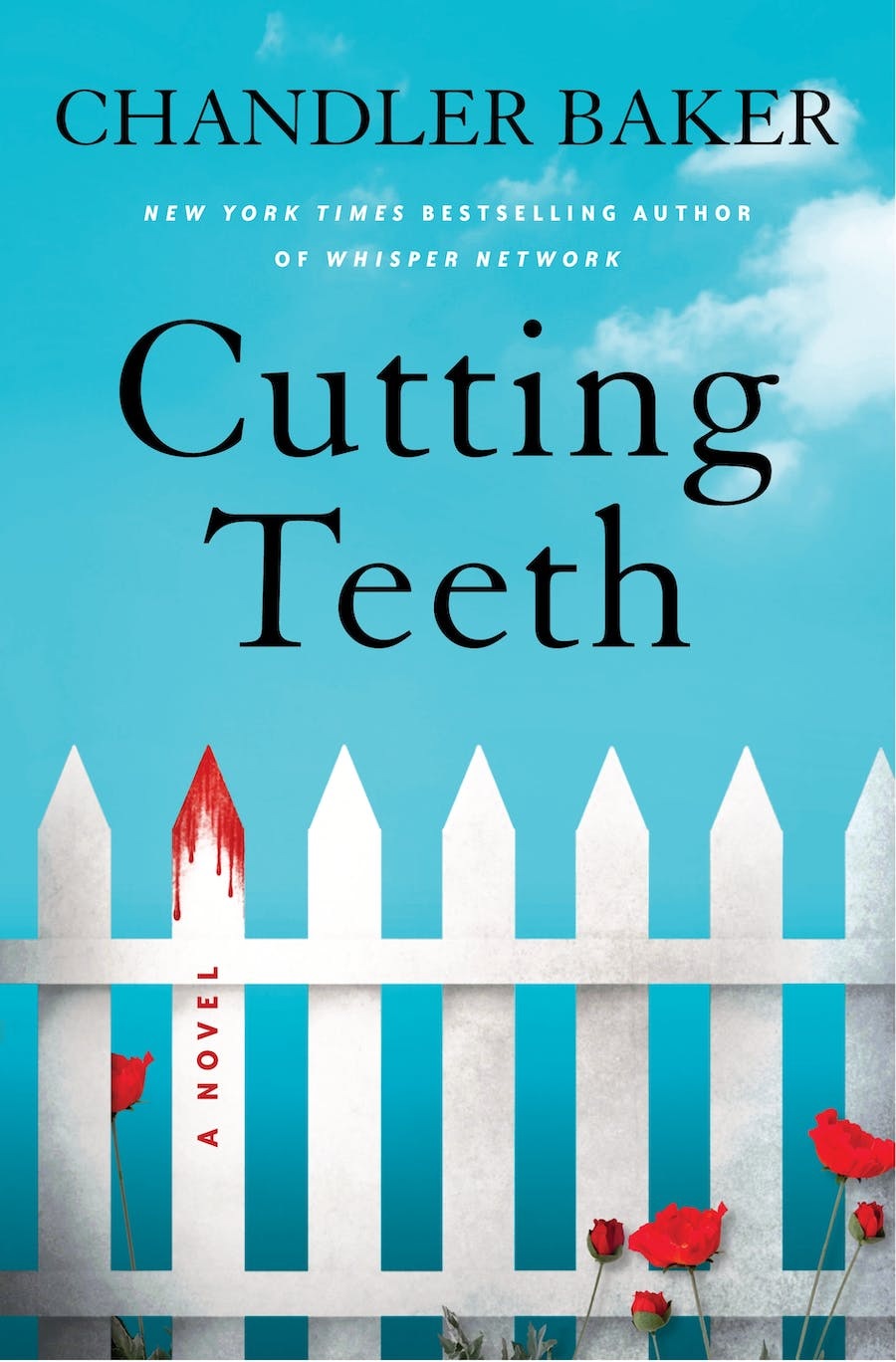 Book you're an evangelist for:
Book you're an evangelist for: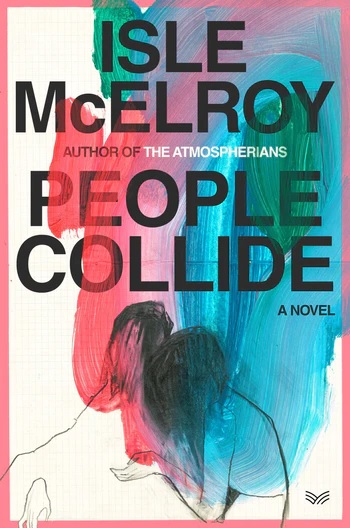 Isle McElroy (
Isle McElroy (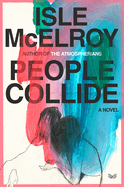
 As a reader, I've long preferred journals and diaries to biographies. In an interview, May Sarton once said that "people don't read the journals to discover me; they read the journals to discover themselves." That sounds about right. Sarton's works--particularly Journal of a Solitude and The House by the Sea--have been part of my life for decades. Other longtime companions include the journals of Ralph Waldo Emerson and Thomas Merton, as well as the travel writings of Matsuo Bashō.
As a reader, I've long preferred journals and diaries to biographies. In an interview, May Sarton once said that "people don't read the journals to discover me; they read the journals to discover themselves." That sounds about right. Sarton's works--particularly Journal of a Solitude and The House by the Sea--have been part of my life for decades. Other longtime companions include the journals of Ralph Waldo Emerson and Thomas Merton, as well as the travel writings of Matsuo Bashō. Just yesterday, I noticed that
Just yesterday, I noticed that  As a writer, I confess I've been pretty rubbish at keeping a journal or diary myself. Not that I haven't tried over the years. I still have some leftover blank books (or semi-blank, I suppose) lying about as evidence of my feeble attempts. Each was purchased with the best of intentions. Each, inevitably, briefly became a commonplace book--the pages filled quotations from books I was reading at the time--and then was abandoned.
As a writer, I confess I've been pretty rubbish at keeping a journal or diary myself. Not that I haven't tried over the years. I still have some leftover blank books (or semi-blank, I suppose) lying about as evidence of my feeble attempts. Each was purchased with the best of intentions. Each, inevitably, briefly became a commonplace book--the pages filled quotations from books I was reading at the time--and then was abandoned. On July 20, Edison wrote: "It's so hot--I put everything off--Hot weather is the mother of procrastination--my energy is at ebb tide--I'm getting Caloricly stupid--Tried to read some of the involved sentences in Miss Cleveland's book, mind stumbled on a ponderous perioration and fell in between two paragraphs and lay unconscious for ten minutes." A nine-day journal. The End. That I can identify with.
On July 20, Edison wrote: "It's so hot--I put everything off--Hot weather is the mother of procrastination--my energy is at ebb tide--I'm getting Caloricly stupid--Tried to read some of the involved sentences in Miss Cleveland's book, mind stumbled on a ponderous perioration and fell in between two paragraphs and lay unconscious for ten minutes." A nine-day journal. The End. That I can identify with.